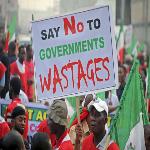Executive Director of Nigeria's ‘Enough is Enough' coalition, Yemi Adamolekun was on her way home from an Occupy Nigeria protest in Lagos Tuesday when she offered two fellow protestors a ride home.
"People are walking two hours to get to protest sites because they are that passionate about what is going on," said Adamolekun. "I gave two gentlemen a ride today on my way back home, and they told me it took them almost two hours to get to the site this morning and they're coming back tomorrow."
Enough is Enough has been calling on the youth of Nigeria, where 75% of the population is under the age of 30, to provoke change for almost two years.
But President Goodluck Jonathan's New Year's decision to remove a fuel subsidy – an act that doubled the price of fuel for Nigerians overnight – catapulted the movement, which has dubbed itself, Occupy Nigeria. "Really from our perspective it was just a trigger," said Adamolekun of the end of the fuel subsidy. "Nigerians have been very quiet for so long. The corruption in the system is known at home and abroad. Lack of infrastructure, rising costs of goods and services."
Though recent protests and nationwide strikes in Nigeria have adopted the West's rallying "Occupy" cry, they have very specific demands for their own country, including reinstating the fuel subsidy, reducing the overall cost of government and addressing corruption in the oil sector, said Adamolekun. "We're going to continue to take over public spaces, we're going to continue to take over public discourse until the government realizes that it's not about subsidy removal but it's about their waste and the corruption in the system," she added.
Adamolekun said the Occupy Nigeria movement is also serving as a unifying factor for the country's Muslim and Christian groups. Increasing attacks on Christian and government targets by the loosely organized group Boko Haram, who claim to be Islamic militants, have caused alarm in the West Africa country and even reprisal attacks. Assailants set fire to a Koranic school in Southern Nigeria Tuesday.
But Adamolekun said the Occupy protests have seen moments of solidarity among the religions. "We've had places from Kano and various places around the country – even in Lagos – where Muslim brothers would be praying and Christians would stand guard," said Adamolekun. "In Niger State two days ago Muslim brothers went around the church to protect the worshippers while they were there."
The Nigerian government has said it will save an estimated $6 billion through the removal of the fuel subsidy – money it says will go to infrastructure and social programs.
